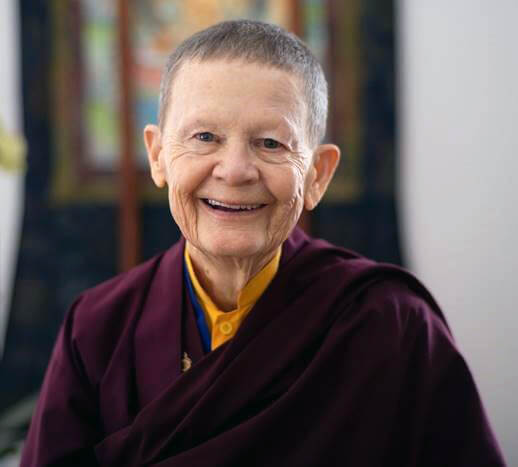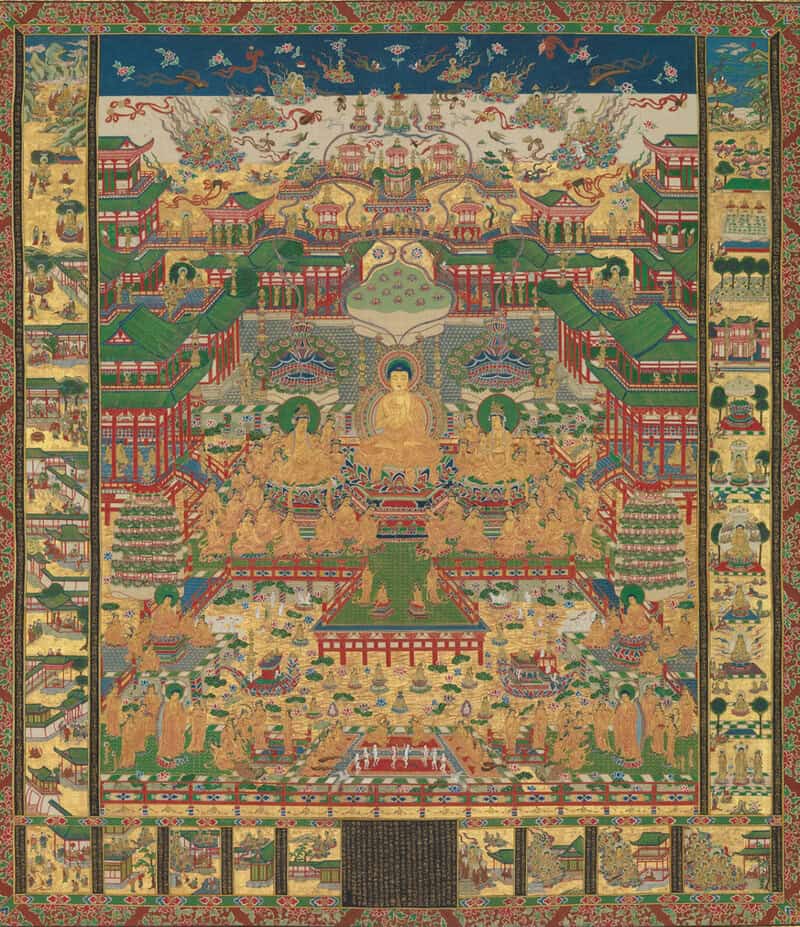I thought I’d just share this teaching from Pema Chodron on one of the slogans of the 7 Point Mind Training. This one cuts really deep for me, and has had a profound influence on my practice.

It’s such an interesting area … this tension between trying to get somewhere (other than where we are now) … and being able to truly open up to what we experience and allowing ourselves to come to rest in peace and compassion ….
Our next slogan is “Abandon any hope of fruition.” You could also say, “Give up all hope” or “Give up” or just “Give.” The shorter the better.
One of the most powerful teachings of the Buddhist tradition is that as long as you are wishing for things to change, they never will. As long as you’re wanting yourself to get better, you won’t. As long as you have an orientation toward the future, you can never just relax into what you already have or already are.
One of the deepest habitual patterns that we have is to feel that now is not good enough. We think back to the past a lot, which maybe was better than now, or perhaps worse. We also think ahead quite a bit to the future – which we may fear – always holding out hope that it might be a little bit better than now. Even if now is going really well -we have good health and we’ve met the person of our dreams, or we just had a child or got the job we wanted-nevertheless there’s a deep tendency always to think about how it’s going to be later. We don’t quite give ourselves full credit for who we are in the present.
For example, it’s easy to hope that things will improve as a result of meditation, that we won’t have such bad tempers anymore or we won’t have fear anymore or people will like us more than they do now. Or maybe none of those things are problems for us, but we feel we aren’t spiritual enough. Surely we will connect with that awake, brilliant, sacred world that we are going to find through meditation. In everything we read -whether it’s philosophy or dharma books or psychology- there’s the implication that we’re caught in some kind of very small perspective and that if we just did the right things, we’d begin to connect with a bigger world, a vaster world, different from the one we’re in now.
One reason I wanted to talk about giving up all hope of fruition is because I’ve been meditating and giving dharma talks for some time now, but I find that I still have a secret passion for what it’s going to be like when-as they say in some of the classical texts, all the veils have been removed.” It’s that same feeling of wanting to jump over yourself and find something that’s more awake than the present situation, more alert than the present situation. Sometimes this occurs at a very mundane level: you want to be thinner, have less acne or more hair. But somehow there’s almost always a subtle or not so subtle sense of disappointment, a sense of things not completely measuring up.
In one of the first teachings I ever heard, the teacher said, “I don’t know why you came here, but I want to tell you right now that the basis of this whole teaching is that you’re never going to get everything together.” I felt a little like he had just slapped me in the face or thrown cold water over my head. But I’ve always remembered it. He said, “You’re never going to get it all together.” There isn’t going to be some precious future time when all the loose ends will be tied up. Even though it was shocking to me, it rang true. One of the things that keeps us unhappy is this continual searching for pleasure or security, searching for a little more comfortable situation, either at the domestic level or at the spiritual level or at the level of mental peace.
Nowadays, people go to a lot of different places trying to find what they’re looking for. There are 12 -step programs; someone told me that there is now a 24-step program; someday there will probably be a 108-step program. There are a lot of support groups and different therapies. Many people feel wounded and are looking for something to heal them. To me it seems that at the root of healing, at the root of feeling like a fully adult person, is the premise that you’re not going to try to make anything go away, that what you have is worth appreciating. But this is hard to swallow if what you have is pain.
In Boston there’s a stress-reduction clinic run on Buddhist principles. It was started by Dr. Jon Kabat-Zinn, a Buddhist practitioner and author of Full Catastrophe Living. He says that the basic premise of his clinic-to which many people come with a lot of pain-is to give up any hope of fruition. Otherwise the treatment won’t work. If there’s some sense of wanting to change yourself, then it comes from a place of feeling that you’re not good enough. It comes from aggression toward yourself, dislike of your present mind, speech, or body; there’s something about yourself that you feel is not good enough. People come to the clinic with addictions, abuse issues, or stress from work-with all kinds of issues. Yet this simple ingredient of giving up hope is the most important ingredient for developing sanity and healing.
That’s the main thing. As long as you’re wanting to be thinner, smarter, more enlightened, less uptight, or whatever it might be, somehow you’re always going to be approaching your problem with the very same logic that created it to begin with: you’re not good enough. That’s why the habitual pattern never unwinds itself when you’re trying to improve, because you go about it in exactly the same habitual style that caused all the pain to start.
There’s a life-affirming teaching in Buddhism, which is that Buddha, which means “awake,” is not someone you worship. Buddha is not someone you aspire to; Buddha is not somebody that was born more than two thousand years ago and was smarter than you’ll ever be. Buddha is our inherent nature – our Buddha nature – and what that means is that if you’re going to grow up fully, the way that it happens is that you begin to connect with the intelligence that you already have. It’s not like some intelligence that’s going to be transplanted into you. If you’re going to be fully mature, you will no longer be imprisoned in the childhood feeling that you always need to protect yourself or shield yourself because things are too harsh. If you’re going to be a grown-up -which I would define as being completely at home in your world no matter how difficult the situation-it’s because you will allow something that’s already in you to be nurtured. You allow it to grow, you allow it to come out, instead of all the time shielding it and protecting it and keeping it buried.
Someone once told me, “When you feel afraid, that’s ‘fearful Buddha.’ ” That could be applied to whatever you feel. Maybe anger is your thing. You just go out of control, and you see red, and the next thing you know you’re yelling or throwing something or hitting someone. At that time, begin to accept the fact that that’s “enraged Buddha.” If you feel jealous, that’s “jealous Buddha.” If you have indigestion, that’s “buddha with heartburn.” If you’re happy, “happy buddha”; if bored, “bored buddha.” In other words, anything that you can experience or think is worthy of compassion; anything you could think or feel is worthy of appreciation.
This teaching was powerful for me; it stuck. I would find myself in various states of mind and various moods, going up and down, going left and right, falling on my face and sitting up-just in all these different life situations-and I would remember, “Buddha falling flat on her face; Buddha feeling on top of the world; Buddha longing for yesterday.” I began to learn that I couldn’t get away from Buddha no matter how hard I tried. I could stick with myself through thick and thin. If one would enter into an unconditional relationship with oneself, one would be entering into an unconditional relationship with Buddha.
This is why the slogan says, “Abandon any hope of fruition.” “Fruition” implies that at a future time you will feel good. There is another word, which is open -to have an open heart and open mind. This is oriented very much to the present. If you enter into an unconditional relationship with yourself, that means sticking with the Buddha right now on the spot as you find yourself.
Because it’s a monastery, there’s nothing you can do at Gampo Abbey that’s fun, unless you like to meditate all the time or take walks in nature, but everything gets boring after awhile. There’s no sex there, you can’t drink there, you also can’t lie. Occasionally we’ll see a video, but that’s rare and usually there’s a dispute about what it’s going to be. The food is sometimes good and sometimes terrible; it’s just a very uncomfortable place. The reason it’s uncomfortable is that you can’t get away from yourself there. However, the more people make friends with themselves, the more they find it a nurturing and supportive place where you can find out the buddhaness of your own self as you are right now, today. Right now today, could you make an unconditional relationship with yourself? just at the height you are, the weight you are, the amount of intelligence that you have, the burden of pain that you have? Could you enter into an unconditional relationship with that?
Giving up any hope of fruition has something in common with the title of my previous book, The Wisdom of no Escape. “No escape” leaves you continually right in the present, and the present is whatever it is, whatever mood you happen to be in, whatever thoughts you happen to be having. That’s it.
Whether you get meditation instruction from the Theravada tradition or the Zen tradition or the Vajrayana tradition, the basic instruction is always about being awake in the present moment. What they don’t tell you is that the present moment can be you, this you about whom you sometimes don’t feel very good. That’s what there is to wake up to.
When one of the emperors of China asked Bodhidharma (the Zen master who brought Zen from India to China) what enlightenment was, his answer was, “Lots of space, nothing holy.” Meditation is nothing holy. Therefore there’s nothing that you think or feel that somehow gets put in the category of “sin.” There’s nothing that you can think or feel that gets put in the category of “bad.” There’s nothing that you can think or feel that gets put in the category of “wrong.” It’s all good juicy stuff-the manure of waking UP, the manure of achieving enlightenment, the art of living in the present moment.
Start Where You Are : A Guide to Compassionate Living by Pema Chodron
Copyright 1994, Shambhala Publications.





Such a great reminder.
For me too!